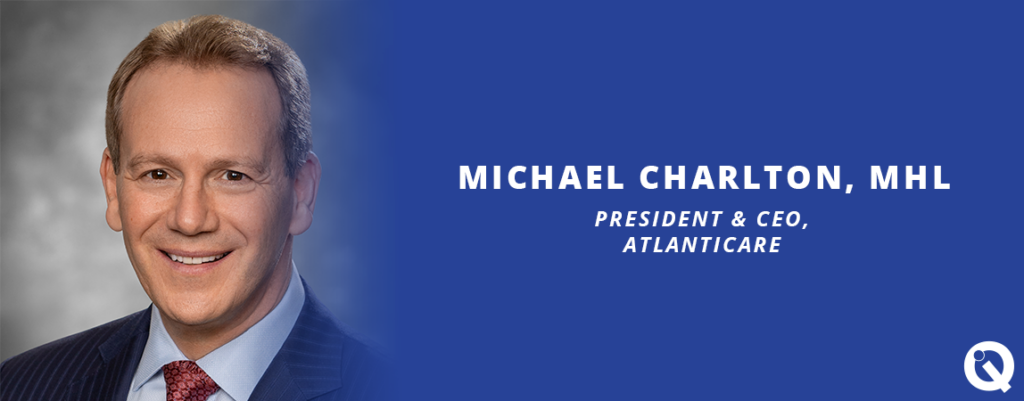Michael Charlton, MHL, President and CEO of AtlantiCare. AtlantiCare has been a member of the Quality Institute for more than a decade.
You recently took over as President and CEO. How does your background in the hospitality industry support your work as CEO?
I have found it to be a natural progression because both industries are about people. The principles we used in hospitality are extremely effective in the health care system. At AtlantiCare, we wake up every day and we are focused on experience, safety, and quality. These are universal concepts.
The health care workforce is stressed as never before. What strategies are you pursuing to address this challenge?
It’s important to acknowledge it’s not merely a workforce issue, but broader systemic problems inherent to the health care system. Over the years the health care industry has piled more and more work on our clinical caregivers. The first approach was to understand the span and scope of work to identify what we could alleviate in terms of administrative burden. AtlantiCare is focusing on streamlining workflows, reducing redundancies, and optimizing resource allocation.
Our goal is to make sure that caregivers can focus on using the skills they went to school for. By reimagining how health care is delivered, we aim to promote work-life harmony for our caregivers while ensuring exceptional patient care.
Comprehensive health care requires reaching beyond the walls of hospitals and into communities. Can you share something about AtlantiCare’s community initiatives and their impact to date?
It starts with an organizational philosophy that translates into a mission that all 6,500 team members must embrace. At AtlantiCare, we recognize the interconnectedness of health care and community well-being. Only 25% of what goes into the wellness and health of an individual is the clinical part. The other 75% are the social determinants.
Our community initiatives are grounded in the thought that we, as an organization, are going beyond the clinical to address these root causes, and either support them through a partnership, or be the convener. Our work in the community spans a wide spectrum, from tackling food insecurity, championing housing solutions, advancing maternal health, building healthy schools, and addressing mental health challenges.
We must constantly engage with the community if we want to solve these big issues. We talk about food insecurity and look to our Vice President of Community Health and Social Impact, Samantha Kiley, and the work that she does with our mobile food operations to deliver quality foods to our underserved and uninsured populations. We talk about homelessness with community and government leaders. How do we effectuate change there? Who do we partner with? How do we not only find a stable place for people to live, but advance them socially, economically, and spiritually?
As the anchor institution in the area, we must lead the way. Annually, we feed over 25,000 individuals through our two healthy food pantries as well as the Mobile Food Market, ensuring nutritious food is accessible to those who need it most. And when schools are out and cafeterias are closed, our Summer Meal program steps in to support families in need. Our transportation program is provided to ease the burden of getting to appointments or treatment, relieving pressure not only on the patient but also on their caregivers.
We have also long offered the most comprehensive behavioral health services in southeastern New Jersey with robust, evidenced-based services offered to children, adults, and families. And yet, despite all these resources, there are still greater needs to meet and additional services to be offered.
You serve a diverse and aging population. How does AtlantiCare work to improve health equity in the communities you serve?
Before you can tackle those challenges, you have to understand them. There are structural inequities and racism already built into the health care system in this country. Whether it’s a payor mix or how patients are viewed — you must understand what your organization has a bias towards and then work to make change.
There are 38,000 people in Atlantic City, and the majority are from traditionally underserved communities. Through programs like Safe Beginning, we provide care for pregnant women and their babies, ensuring a healthy start to life. Our PACE program offers comprehensive care for the elderly in the comfort of their own homes, recognizing the importance of dignity, consistency, and familiarity in their care. And we are connected with community leaders to ensure we are reaching the populations of people who are skeptical about healthcare.
One of the biggest commitments we have to our underinsured population is our FQHC, our Federally Qualified Health Center. It’s a model that allows people to get connected to the resources they need. We’re structuring our work to make sure we’re delivering the right care in the right place and have the right resources accessible to the people who need them.
Finally, we like to ask a question beyond a person’s professional work. If you could choose anyone (throughout history or alive today), who would be your hero?
If I had to choose, I would go with a contemporary business leader — Bob Iger, from The Walt Disney Company. His pre-Covid track record was visionary, the way he created stories, the way he connected the dots, the way he built an organization around purpose, caring, and happiness. Just think about it. You pay somebody a standard wage, and they have to show up in 110 degree-heat, put a character outfit on, meander around the park all day — and they’re some of the happiest employees in the country.
That’s tying a group of individuals to something that is bigger than you … to purpose, to joy, to happiness. Iger is back again under difficult circumstances in a changed world. He’s making the hard decisions, but he’s also gearing that organization for the future.

